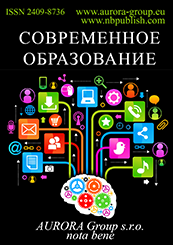Education
Reference:
Ursul, A.D., Ursul, T.A. (2012). Evolutionary Paradigm and Models of Education in the XXI Century. Modern Education, 1, 1Ц67. https://doi.org/10.7256/2306-4188.2012.1.59
Abstract:
We propose an evolutionary approach to the study of emerging models and paradigms of education in the perspective of globalization and the transition to sustainable development. Therefore assumed fundamental evolutionary transformation of educational processes, the vector is directed from its present form to education for sustainable development and the formation of global education oriented at noosphere.
Keywords:
globalization of science, global education, education, advanced education, sustainable development, educational paradigm, environmental education, evolutionary teaching, evolution of the system of education, evolutionary approach
Effectiveness of training
Reference:
Remneva, N.A., Stozharova, M.Y. (2012). Influence of Mathematical Activity on Development of Preschool Children's Cognitive Abilities. Modern Education, 1, 68Ц78. https://doi.org/10.7256/2306-4188.2012.1.211
Abstract:
This article is devoted to the two questions: do mathematical operations affect the formation of cognitive abilities and how to develop cognitive abilities of the senior preschool children at pre-school institutions. The authors of the article offer a system of education established especially for kindergartens. The authors summarize data of the pilot study that illustrates the use of various forms of organized mathematical activity in the development of cognitive abilities of the senior preschool children.
Keywords:
school maturity, mathematical activity, pre-school children, cognitive abilities
Spiritual and moral search
Reference:
Parkhomenko, R.N. (2012). The national idea and the present time. Modern Education, 1, 79Ц105. https://doi.org/10.7256/2306-4188.2012.1.135
Abstract:
The article discusses the role of the value of the national idea in Russia. The first part of the article shows the genesis of the concept of “Russian idea” in Russian philosophical tradition. The concept of the Russian idea was developed and put into circulation Solovyov Vl.S. in 1887-1888. His speech on “Russian idea” in 1888 in Paris defined the “meaning the existence of Russia in world history” as a mediator in the spiritual unity of East and West. The Eurasianism movement arose in 1921 further develops the concept of the Russian idea as an expression of identity of Russia in the world as a healthy spirit energy opposed to the traditions and foundations of Western Europe. Taking the traditional among the Russian intellectuals idea of the interrelation and confrontation of “Slavophiles” and “Westerners” in Russian history, the followers of the Eurasianism tried to give their philosophical concepts ideological form. The key moment of the study is in comparison of the role of the concept of national idea in Russia and Germany. The author also provides current opinions on the concept by both Russian and foreign intellectuals.
Keywords:
Special way, Eurasianism, Westerners, Slavophiles, Germany, Russia, Russian idea, National Idea, West, national consciousness
Earnest discussion
Reference:
Karpenko, A.L. (2012). Homosexuality and Our Future. Modern Education, 1, 106Ц120. https://doi.org/10.7256/2306-4188.2012.1.23
Abstract:
Homosexuality is a widespread phenomenon in the modern world. However, just like in recent years, features of people of nonconventional orientation and their possible influence on formation of sexual orientation of the young generations still interest the scientists enanged in this theme. The author of the article describes the history and causes of of homosexuality. The question is asked to the reader, are we ready to work side by side with the people having nonconventional sexual orientation? The author also discusses the influence of mass media on formation of sexual identity of modern teenagers.
Keywords:
homosexuality, gender, identity, socialization, environment, behavior, teenager, influence, personality
Historicism as a principle
Reference:
Gulyaikhina, E.S. (2012). Development of American School in Early XIX Century: Implementation of Joseph Neef Democratic Ideals in Educational Process. Modern Education, 1, 121Ц146. https://doi.org/10.7256/2306-4188.2012.1.70
Abstract:
The article is devoted to Joseph Neef’s educational activities who sequentially implemented J.G. Pestalozzi’s ideas in the socio-cultural reality of the New World in early XIX-th century, seeking to do them basic principles of forming system of USA public education. The author examines the contribution to natural education development by the American educator and makes a comparative analysis of pedagogical conceptions of Pestalozzi and J. Neef.
Keywords:
history of education, public education, USA, Joseph Neef, Pestalozzi, democratic ideals, nature-aligned education, developmental education
Didactics
Reference:
Sidorova, G.P. (2012). Value of a Teacher's Profession in the Soviet Culture and its Reflection in the Popular Art of the 1960-1980's. Modern Education, 1, 147Ц157. https://doi.org/10.7256/2306-4188.2012.1.49
Abstract:
In the article on the basis of approach of the systems, comparative and semiotics analysis, wide circle of sources - artistic texts of 1960-1980th the features of artistic representations of profession of teacher come to light in a soviet mass art. In artistic representations the features of profession of teacher come to light in the aspect of her value for welfare, in a dynamics from time «thaw» to «seventieth». Images presented the profession of teacher in two discursis: ideological and everyday. The transitional type of soviet society, his difficult structure, subject of culture, is a man of different axiology types, gender feature of pedagogical labour was reflected in artistic representations of profession of teacher. Finally, in characters of teacher reflected deep senses of soviet culture: displacement valued orientations societies from socialistic to the traditional values and values of mass society of consumption, disparity ideological and everyday discursis about final and instrumental values, explaining activity of majority of subjects of culture.
Keywords:
cultural research, value, profession, teacher, Soviet, culture, mass (popular), art, art related, representation
 This work is licensed under a Creative Commons Attribution-NonCommercial 4.0 International License.
This work is licensed under a Creative Commons Attribution-NonCommercial 4.0 International License.










 © 1998 Ц 2025 Nota Bene. Publishing Technologies. NB-Media Ltd.
© 1998 Ц 2025 Nota Bene. Publishing Technologies. NB-Media Ltd.




